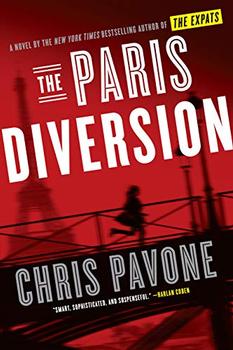Book Club Discussion Questions
Want to participate in our book club? Join BookBrowse and get free books to discuss!
Please be aware that this discussion guide will contain spoilers!
- Kate Moore, the protagonist of The Paris Diversion, is also the main character of Chris Pavone's novel The Expats. In this book, she once again leads a double life when she returns to work as a spy, this time in Paris. There are moments in which Kate feels conflicted between her devotion to her family and her dedication to her professional life. Have you experienced similar tensions in your life? Would you agree that it is important to reserve parts of ourselves from our families, and to find passion and meaning in other vocations or work? Might doing so make us better partners or parents?
- "This is the difference between Dexter's sham job and Kate: he's an amateur and she's a pro." The Paris Diversion and The Expats challenge standard power dynamics and gender roles in marriage and in the workplace. How did you find that applied to the characters here? How do Kate and Dexter compare to Susanna and Chris in this respect?
- At times, Kate and Dexter's relationship is tinged by residual tensions from past betrayals—and yet their marriage endures. How would you define their partnership and the love that exists between them? What, in your view, makes for a stable relationship or marriage?
- Hunter Forsyth isn't able to see his relationship with Colette clearly. For such an accomplished businessman who is in general so sharp, why is he so blind to this reality? Do other characters misunderstand their own relationships?
- The novel touches on important and universal themes of fairness and merit, and how one assesses what one deserves in life. Do you think any characters get what they deserve? Did you find other characters' fates undeserved or unjust?
- Pavone challenges readers to question their assumptions about terrorism: who are the terrorists, what are the forces at work behind their acts, what are the goals? In The Paris Diversion, how do the perpetrators manipulate such preconceptions? How does the author manipulate readers?
- The characters in The Paris Diversion are multifaceted, complex, and often galvanized by a deep-rooted concern for the well-being of their families. At their core, do you think Pavone's characters are more alike than they are different? Did you ever feel an increased sense of sympathy or understanding for any of the characters as you learned more about their histories, grievances, and traumas?
- Where do you see revenge as a driving force for some of the characters in The Paris Diversion? How does vengeance reveal itself to enact injustice rather than right a wrong? Did you draw any messages from the book about the moral importance of forgiveness?
- In an age of digital innovation, the world is mediated and experienced through the many screens of modern-day technology. Do you think that any of the characters in The Paris Diversion strive to restore a feeling of human connection in the material world? Do you think that the expats seek a sense of belonging and community with one another, despite being far from their original homes, because of that?
- Pavone writes in great, wonderful detail about Paris—how did the international setting add to the intrigue of the interconnected terrorist plot and complex financial heist? How did the culture feel similar to or different from that of the US?
Unless otherwise stated, this discussion guide is reprinted with the permission of Ballantine Books. Any page references refer to a USA edition of the book, usually the trade paperback version, and may vary in other editions.
